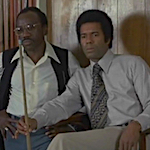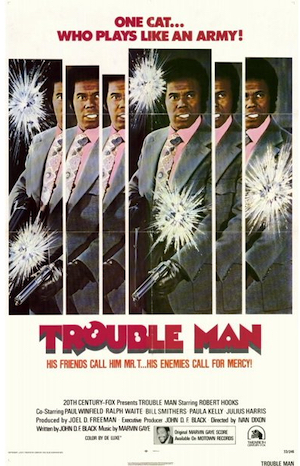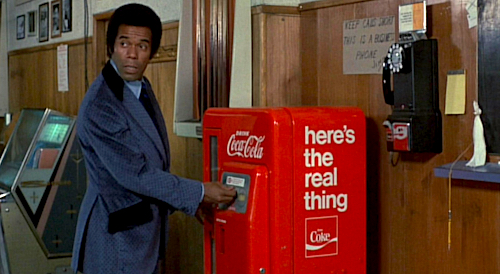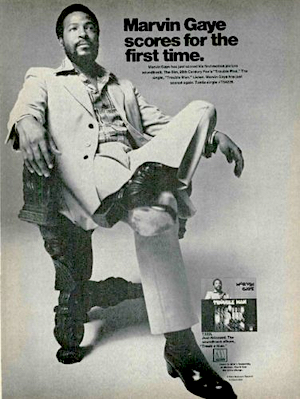 TROUBLE MAN is a solid tough guy movie from the early ‘70s Black action cinema movement. Director Ivan Dixon was an actor (PORGY AND BESS, A RAISIN IN THE SUN, NOTHING BUT A MAN) turned TV director (The Bill Cosby Show, Room 222, Mod Squad) making his first theatrical feature. He followed this with the much more politically radical THE SPOOK WHO SAT BY THE DOOR, and I don’t think it’s a coincidence that he went back to TV after that.
TROUBLE MAN is a solid tough guy movie from the early ‘70s Black action cinema movement. Director Ivan Dixon was an actor (PORGY AND BESS, A RAISIN IN THE SUN, NOTHING BUT A MAN) turned TV director (The Bill Cosby Show, Room 222, Mod Squad) making his first theatrical feature. He followed this with the much more politically radical THE SPOOK WHO SAT BY THE DOOR, and I don’t think it’s a coincidence that he went back to TV after that.
The script is by John D.F. Black, a white TV writer who had worked on some of the same shows as Dixon and then wrote SHAFT. The feel of this one is closer to SHAFT than SPOOK. It’s a serious and gritty movie, but it’s less concerned with militancy and more the standard staples of the genre often referred to as Blaxploitation: the wish fulfillment of larger-than-life manliness, some garish period style, and an outstanding soundtrack album by a genius soul artist – Marvin god damn Gaye!
The hero (Robert Hooks, STAR TREK III: THE SEARCH FOR SPOCK, King David in POSSE) is actually called Mr. T, or sometimes just T. Though he might be able to make a claim for Toughest Man in the World, he has little else in common with the other Mr. T. He has regular hair and wears suits and ties. Sometimes a little flashy, I guess. And the ties are almost as wide as your head, but everybody else in the movie is wearing those too.
Wikipedia describes T as “a hard-edged private detective,” which I guess is technically true, but it would’ve never occurred to me to describe him that way. I got the impression his primary profession was billiards player, something he’s so good at he has the means to give back as a freelance badass. His South Central neighborhood basically regards him as Don Corleone.
 He walks into the billiards hall, a guy gives him a pound, when he’s challenged, some guys know to take the cover off a special table reserved for the occasion. While he’s busy humiliating his cocky challenger people are coming up to him telling him their problems. And he follows through. His guy (Bill Henderson, NO HOLDS BARRED) tells him about this baby that was injured because of a shitty handrail, so he goes right to the slumlord and scares him into making it right. The best part is when he walks in, the secretary asks, “Can I help you, sir?” and he says, “Yeah, just stand here and don’t ring his phone ’til I leave,” and barges into the guy’s office.
He walks into the billiards hall, a guy gives him a pound, when he’s challenged, some guys know to take the cover off a special table reserved for the occasion. While he’s busy humiliating his cocky challenger people are coming up to him telling him their problems. And he follows through. His guy (Bill Henderson, NO HOLDS BARRED) tells him about this baby that was injured because of a shitty handrail, so he goes right to the slumlord and scares him into making it right. The best part is when he walks in, the secretary asks, “Can I help you, sir?” and he says, “Yeah, just stand here and don’t ring his phone ’til I leave,” and barges into the guy’s office.
Later, when he mentions his private detective’s license, it’s to tell some cops that he legally could be carrying a gun even though he’s not. So it comes across just as an interesting tidbit – he also dabbles in private investigations. It’s another skill he has, just like he knows how to pick locks and rewire an elevator system. He’s a renaissance man.
Chalky (Paul Winfield, STAR TREK II: THE WRATH OF KHAN, THE LOST MAN, WHITE DOG) and his white Austin-Powers-looking buddy Pete (Ralph Waite, COOL HAND LUKE, CHATO’S LAND, THE MAGNIFICENT SEVEN RIDE!) come to T because they run a dice game that keeps getting robbed by guys in ski masks. T sets up a plan to protect the next game and catch the culprits, but they’re really trying to set him up, shooting a guy that works for local kingpin Big (Julius Harris, following SHAFT’S BIG SCORE and SUPER FLY, BLACK CAESAR). So Trouble Man’s troubles are just the suspicion of the cops, the wrath of Big, and the betrayal of Chalky and Pete. No trouble at all.
T has a fashionable girlfriend named Cleo (Paula Kelly, SWEET CHARITY, DROP SQUAD) whose role unfortunately is to wait for him in their beautiful era-appropriate apartment, occasionally playing piano. She’s not too thrilled when he calls her and demands she pack a bag to leave town, no explanation offered. (Always a relationship issue when that comes up.) In the tradition of the genre, T is a ladies man – there are two different characters implied to be former lovers excited to see him and willing to do anything for him – but he stays loyal to Cleo. Well, at least until the end when he hits on a cop (Tracy Reed, RUNNING SCARED), gets her to help him and then leave with him.
“My name’s T, baby.”
“I know who you are.”
As I’ve mentioned before, I’m a sucker for the superficial visual pleasures of ‘70s movies, because I like checking out his blue velvet suit, the striking design of the wallpaper, etc. I like the fantasy of this world of the past where everybody’s okay wearing polyester and where whatever home, business or office you visit you’ll be offered a drink or access to an open bar. (At the dice game he requests gin with one ice cube.)
 In the billiards hall I kept admiring the sleek retro Coke machine. Only fifteen cents in the glass bottle. And then later it’s revealed that he has a gun hidden inside it for emergencies. A good set up.
In the billiards hall I kept admiring the sleek retro Coke machine. Only fifteen cents in the glass bottle. And then later it’s revealed that he has a gun hidden inside it for emergencies. A good set up.
Chalky and Pete eventually get what they deserve, but at times I kind of felt bad for them. Everyone else is experiencing the joys of the era, but these guys seem to spend most of their time together in small offices. They work out of a beautiful old theater that’s open all night, but their office is up above and might as well be on a construction site.
I remember not being very impressed by TROUBLE MAN when I was younger, but now I really like it. It’s a good rendition of this type of unfuckwithable anti-hero, not a goody two shoes but a good person, a guy who can pull off anything, has no problem telling a police captain (William Smithers, DEATHSPORT) to fuck off, uses his power to help the downtrodden and then doesn’t take credit for it.
 And of course I realized even back then that the soundtrack is what is now known as a banger. It surprises me that Marvin Gaye was willing to contribute to this macho movie with DAWN OF THE DEAD colored blood as his followup to What’s Going On, but I guess he was into it. He had just achieved full artistic control (plus the biggest payday for an R&B singer to that date), but Motown asked him if he was interested in doing this movie they made a deal for, and he was. (I don’t think Stevie would’ve done it. He was working on Talking Book.)
And of course I realized even back then that the soundtrack is what is now known as a banger. It surprises me that Marvin Gaye was willing to contribute to this macho movie with DAWN OF THE DEAD colored blood as his followup to What’s Going On, but I guess he was into it. He had just achieved full artistic control (plus the biggest payday for an R&B singer to that date), but Motown asked him if he was interested in doing this movie they made a deal for, and he was. (I don’t think Stevie would’ve done it. He was working on Talking Book.)
Gaye was of course a very sincere artist, so he follows the Curtis Mayfield SUPER FLY tradition of singing about some of the characters and events of the movie, giving voice to T’s emotions not evident in the movie. Those are great, but man, to hear songs like “’T’ Plays It Cool” where he just grooves with funky keyboards and wah wah guitars…
(That’s from an expanded edition I didn’t know I should’ve bought while it was available.)
Also, the soundtrack cracks me up because 8 of the 13 tracks on the original album have either “Trouble Man” or “T” in their titles:
Main Theme From Trouble Man (2)
“T” Plays It Cool
Trouble Man
Theme From Trouble Man
“T” Stands For Trouble
Main Theme From Trouble Man
Don’t Mess With Mister “T”
There Goes Mister “T”
It was Gaye’s only soundtrack. He followed it with another classic, Let’s Get It On.
I like Hooks in this movie. He has a look and a sense of coldness that make him different from other actors who could’ve played the role, like Jim Brown or Fred Williamson. His background was also different – in 1964 he had founded a free acting workshop for urban youth called the Group Theatre Workshop, producing and advocating for plays about the Black experience, getting enough attention to receive funding from the Ford Foundation to create the Negro Ensemble Company with playwright Douglas Turner Ward and theater manager Gerald S. Krone. Not everybody liked the name, but it was intended as a tribute to the Harlem Renaissance. The original company included Rosalind Cash and Moses Gunn, with Michael A. Schulz (later director of COOLEY HIGH, CAR WASH, KRUSH GROOVE, THE LAST DRAGON, DISORDERLIES, and many more) as director. Later alumni include Debbie Allen, Angela Bassett, Avery Brooks, Keith David, Bill Duke, Giancarlo Esposito, Laurence Fishburne, Danny Glover, Louis Gossett Jr., David Allen Grier, Sherman Hemsley, Samuel L. Jackson, Delroy Lindo, S. Epatha Merkerson, Garrett Morris, Ron O’Neal, Phylicia Rashad, Richard Roundtree and Denzel Washington (who was in A Soldier’s Play, which won a Pulitzer). And believe it or not that’s a heavily edited list. So founding that group was a pretty big contribution to the world.
He wasn’t in any other movies considered Blaxploitation, unless you count Gordon Parks Jr.’s last film, AARON LOVES ANGELA, which starred Hooks’ teenage son Kevin. The younger Hooks was a child actor known for The White Shadow and SOUNDER (co-starring with Winfield) who followed the Ivan Dixon path of moving behind the camera. He directed his father in HEAT WAVE, PASSENGER 57, FLED, GLORY & HONOR, plus episodes of V, Dragnet and Lincoln Heights.
Apparently the Medved brothers put TROUBLE MAN in their The Fifty Worst Films of All Time book – surely an honor. Vincent Canby called it “a horrible movie,” but I think his criticisms are well-intended, excoriating it as an extreme example of “white-financed black films” that glorify violence and sexism in the name of capitalism. He called it an “all-American movie that urges the preservation of the rotten system that makes all the loot possible. In the most mindless fashion, this commercial film neutralizes not revolution but all sorts of other less cataclysmic social changes.”
I don’t think depiction is endorsement here, and I bet we could find white directors he gave more leeway in stories of amorality, but he’s right that these aren’t values we want to see in the real world, so I won’t get mad at him. I’ll leave that to T.


























September 8th, 2020 at 8:46 pm
Underrated and underseen; it always makes me happy when this movie gets a nod from hip hop, whether it comes from Big Daddy Kane or TI (the first two that come to mind, but there are others).